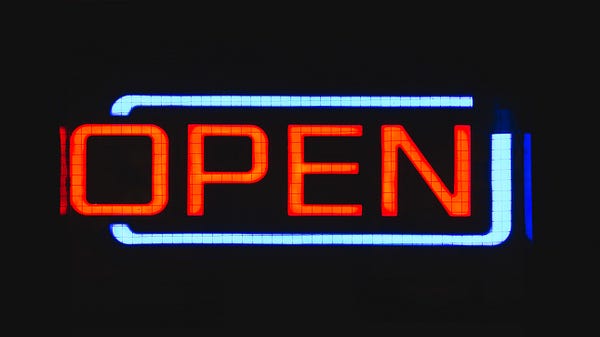Corda: Open Source Community Update
May 13, 2018
Corda: Open Source Community Update
The Corda open source community is getting big… it’s time for a dedicated corda-dev mailing list, a co-maintainer for the project, a refreshed whitepaper, expanded contribution guidelines, and more..!
It feels like Corda took on board some rocket fuel over the last few months. Corda’s open source community is now getting so big and growing so fast that it’s just not possible to keep up with everything any more — a nice problem to have, of course. And I think this is a sign that we’re reaching a tipping point as an industry as people make their choices and the enterprise blockchain platforms consolidate down to what I think we’ll come to describe as “the big three”.
Here’s what I think is going on:
I predicted some time ago that the market will insist that enterprise blockchain platforms are truly open — and they will begin to reject those that are not. And I think we are now seeing evidence of this consolidation: for those of you with access to Gartner reports, take a look at “Blockchain Trials Across Industries Show a Market in Transition” (Report ID: G00352760).
The data in that report is stark: 12–24 months ago, companies around the world were experimenting with tens of different enterprise blockchain platforms. In the last twelve months? There has been an utterly decisive shift: three platforms are pulling away, and the rest are fading into obscurity or retreating to narrow vertical niches. The “big three” platforms? The various Enterprise Ethereum codebases, Hyperledger Fabric… and Corda. Successful businesses know that foundational platforms need vibrant ecosystems and, today, that means these core technologies need to be open source.
Now, firms can develop commercial offerings around these open platforms, of course, as IBM is doing, for example, with its proprietary “IBM Blockchain” offering. And that’s fine. It’s no secret, after all, that my team is working on a commercial distribution of Corda, at the same time as we continue to be a huge contributor to the underlying Corda open source project. But the market expects and demands that those core platforms are exuberantly open.
And when you get it right, the results are amazing. By way of example of the growth in the Corda ecosystem, here’s just a tiny snapshot of some of what I’m seeing in terms of activity from the community in only the last few weeks…
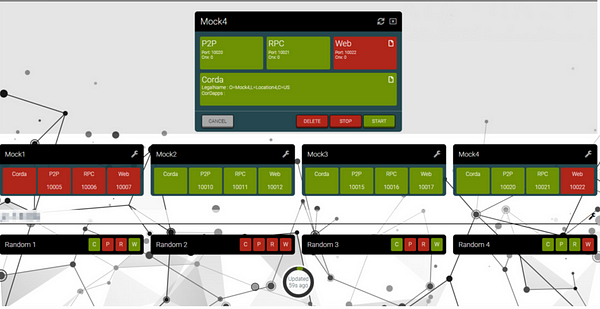
A new Corda monitoring dashboard, a stealth-mode CorDapp with decentralized governance and economics, a seriously significant software firm going live with a brand-new syndicated lending solution, one of the world’s largest exchange groups teaming up with a startup tokenizing high-quality liquid assets, tokenized oil and gas royalties, tokenised precious metals, some soon-to-be-announced projects that will really surprise you, and these are just the ones I know about and can remember from the top of my head as I fly out to Consensus 2018. In case it isn’t obvious, Corda is for everybody.
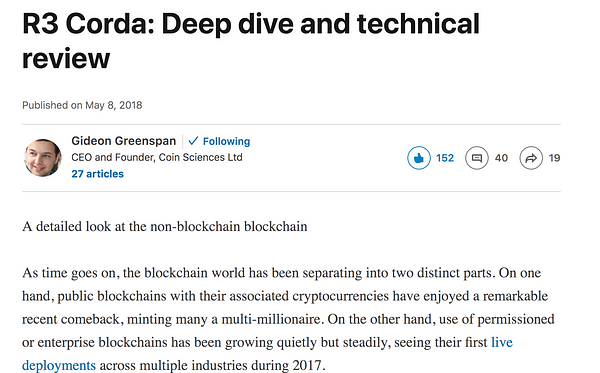
I was thinking about this “big three” phenomenon earlier in the week when I read this really detailed independent technical review of Corda that has just been published, by Gideon Greenspan. It’s well worth a read. Full disclosure: it’s not an entirely uncritical report by any means. But that’s OK. Vibrant communities can debate their strengths and weaknesses, and we get stronger from robust peer review. And, of course: would anybody have bothered to write such a forensic review of an irrelevant platform? No. Corda, as one of the big three, matters and needs to be studied. We deserve to be scrutinised. So I’m grateful to Gideon for taking the time to really study the platform and provide an independent review and analysis. I don’t agree with all his points, of course. But that’s fine. Intelligent readers can draw their own conclusions. And you’ll see me arguing hard about the points in the analysis I disagree with in the comments to that piece..!
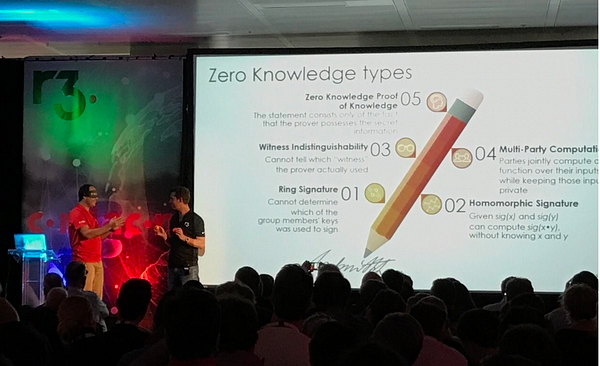
Corda’s increasing prominence also means we have increasing responsibilities to the broader community. For example, practitioners doing fundamental research need to know what the users of the platforms of the future need from them. It’s why Kostas from our team — famous for being the guy whose ZKP demonstration is used by Wikipedia – was a core participant at last week’s Zero-Knowledge Proof Standardisation Workshop, representing the Corda community. Corda is perhaps more famous for its advanced usage of Intel SGX, but it’s less well-known that our roadmap also has ZKP in its future and the techniques needed to make SGX work securely in the presence of side-channels are not actually all that different from those needed to make general-purpose ZKP work.
And it’s also important to remember that ecosystems don’t exist in vacuums. They interact. We made a number of technology decisions at the outset to ensure Corda was designed to be as accessible as possible to the developer community. It is written in one of the fastest growing and most productive modern languages around — Kotlin— which runs on the Java Virtual Machine and you can write CorDapps in any JVM language of your choice. Instantly, there are almost ten million developers who can pick up Corda easily and build Corda apps that make use of the vast array of libraries and third-party code that exists for the Java platform.
What started in 2015 as an alliance of nine banks committed to delivering the next generation of blockchain technology has evolved to a network of over 200 banks, insurance companies, technology companies, software firms, central banks, startups and regulators on six continents. In short, we’re open — and are going to get a whole lot more open in the coming weeks and months.
The result of all this is that the Corda community is huge and getting bigger by the day. So it’s time to make a few changes.
First, we’ve just set up two new public, open-access mailing lists. This is because the growth in our Slack community is becoming overwhelming… I have no idea how Mike and the other developers who hang out on there keep up. We hope these new mailing list will massively improve the “findability” of Corda information, which too easily gets lost on Slack. Here are the two new mailing lists:
- corda-dev, where all the Corda core developers and those building on the platform will begin to hang out, where design docs get posted for review and so forth.
- corda-announce, a lower-traffic mailing list with periodic important announcements.
Secondly, the lead maintainer of Corda, Mike Hearn, announced Joel Dudley as the first co-maintainer of the project. Congratulations Joel, and thank you. See Mike’s email — to corda-dev, naturally — announcing this. For those who don’t know him, Joel is a member of our dev relations team, when he’s not shilling for Corda in front of hundreds of people 🙂
Thirdly, we’ve heard that some people don’t realise that Corda really is open. So we’ve updated our contribution guidelines to make it crystal clear that we really do welcome contributions to the platform. I think this policy means Corda is now one of the most transparent, if not the most transparent, enterprise blockchain platforms out there.
Fourthly, we’ve updated the list of people who have contributed to Corda in some way (design, code, ideas). You might be surprised how long the list is… But it should be no surprise. Corda is as good as it is because of the awe-inspiring list of leaders from around the world who helped design, critique and develop it.
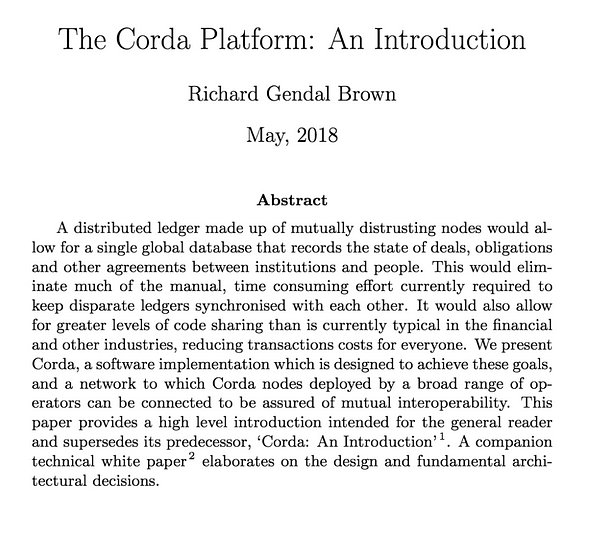
Fifthly (is that a word?), the new Corda introductory whitepaper (the “Corda Platform Whitepaper”) is under review and will be formally merged soon. You can see a sneak-preview here. There’s still time to comment on the PR.
And there’s more to come in the coming weeks, including inviting feedback from the community on our plans for governance of Corda Network, a revamped https://corda.net, more public design reviews, and more.
Becoming part of the Corda open source ecosystem — as well as the broader R3 Alliance — may be easier than you think. Whatever your industry, whatever your goal, get in touch with us to find out why Corda is the only enterprise blockchain platform that can truly meet your requirements. Or simply download Corda and start building today.
These are exciting times!
